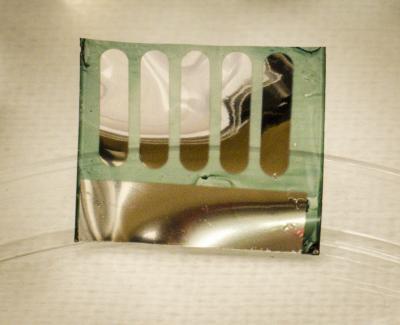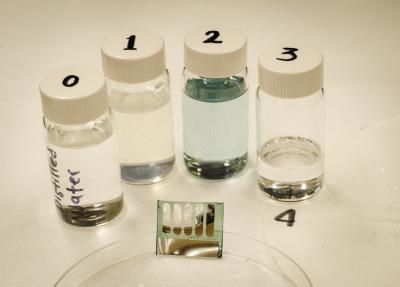Solar cells act something like leaves, capturing sunlight and turning it into energy - unfortunately the manufacturing of solar cells, unlike trees, is something of an environmental disaster. From rare earth metals to all kinds of other materials due to substrates and cells, solar panels have to function for decades before they break even, as far as any ecological savings are considered.
If only solar cells could instead be made from trees.
Georgia Tech and Purdue researchers say they have done it; they have developed efficient solar cells using natural substrates derived from trees. Just as importantly, by fabricating them on cellulose nanocrystal (CNC) substrates, the solar cells can be quickly recycled in water at the end of their life cycle.

A solar cell fabricated at Georgia Tech on nanocellulose substrates derived from trees. Credit: Canek Fuentes-Hernandez, Georigia Tech
The researchers report that the organic solar cells reach a power conversion efficiency of 2.7 percent, an unprecedented figure for cells on substrates derived from renewable raw materials. The CNC substrates on which the solar cells are fabricated are optically transparent, enabling light to pass through them before being absorbed by a very thin layer of an organic semiconductor. During the recycling process, the solar cells are simply immersed in water at room temperature. Within only minutes, the CNC substrate dissolves and the solar cell can be separated easily into its major components.
Georgia Tech College of Engineering Professor Bernard Kippelen led the study and says his team's project opens the door for a truly recyclable, sustainable and renewable solar cell technology.

Vials that contain the different parts of the cell after it was dissolved in water and the organic solvent. Credit: Canek Fuentes-Hernandez, Georgia Tech
"The development and performance of organic substrates in solar technology continues to improve, providing engineers with a good indication of future applications," said Kippelen, who is also the director of Georgia Tech's Center for Organic Photonics and Electronics (COPE). "But organic solar cells must be recyclable. Otherwise we are simply solving one problem, less dependence on fossil fuels, while creating another, a technology that produces energy from renewable sources but is not disposable at the end of its lifecycle."
To date, organic solar cells have been typically fabricated on glass or plastic. Neither is easily recyclable, and petroleum-based substrates are not very eco-friendly. For instance, if cells fabricated on glass were to break during manufacturing or installation, the useless materials would be difficult to dispose of. Paper substrates are better for the environment, but have shown limited performance because of high surface roughness or porosity. However, cellulose nanomaterials made from wood are green, renewable and sustainable. The substrates have a low surface roughness of only about two nanometers.
"Our next steps will be to work toward improving the power conversion efficiency over 10 percent, levels similar to solar cells fabricated on glass or petroleum-based substrates," said Kippelen. The group plans to achieve this by optimizing the optical properties of the solar cell's electrode.
There's also another positive impact of using natural products to create cellulose nanomaterials. The nation's forest product industry projects that tens of millions of tons of them could be produced once large-scale production begins, potentially in the next five years.
A provisional patent on the technology has been filed with the U.S. Patent Office.
Citation: Yinhua Zhou, Canek Fuentes-Hernandez, Talha M. Khan, Jen-Chieh Liu, James Hsu, Jae Won Shim, Amir Dindar, Jeffrey P. Youngblood, Robert J. Moon&Bernard Kippelen, 'Recyclable organic solar cells on cellulose nanocrystal substrates', Scientific Reports 3, Article number: 1536 doi:10.1038/srep01536




Comments